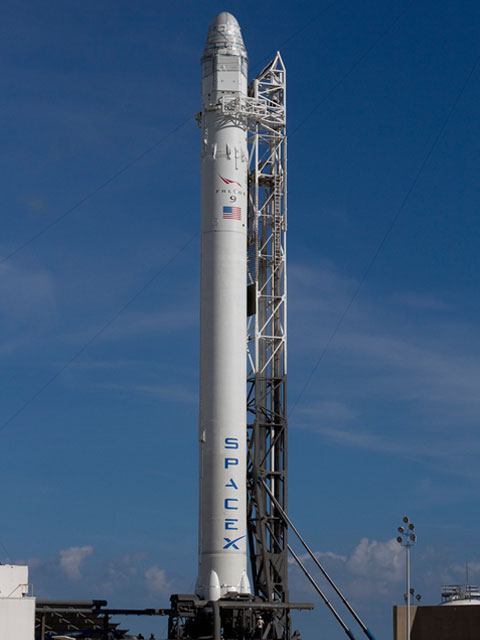SpaceX to Launch 1st Private Capsule to Space Station This Week

Get the world’s most fascinating discoveries delivered straight to your inbox.
You are now subscribed
Your newsletter sign-up was successful
Want to add more newsletters?
Join the club
Get full access to premium articles, exclusive features and a growing list of member rewards.
The private spaceflight company SpaceX is preparing to launch a robotic capsule to the International Space Station this week, following a series of delays that postponed the historic first flight of a commercial spacecraft to the orbiting outpost.
SpaceX is slated to launch its Dragon capsule to the space station atop the company's own Falcon 9 rocket on May 19 from the Cape Canaveral Air Force Station in Florida. Liftoff is set for 4:55 a.m. EDT (0855 GMT).
The test flight was originally scheduled to occur on April 30, but has been delayed several times to complete final checks of the spacecraft's flight software.
The Dragon launch will now occur shortly after three new crewmembers arrive at the orbiting complex. A Russian Soyuz spacecraft, carrying NASA astronaut Joe Acaba and Russian cosmonauts Gennady Padalka and Sergei Revin, is slated to blast off from Kazakhstan tonight (May 14), and will arrive at the station on May 17.
The test flight of the unmanned Dragon capsule is designed to assess the spacecraft's ability to carry cargo to the orbiting outpost. If successful, it will mark the first time a privately built spaceship has docked with the $100 billion space station. [Gallery: Dragon, SpaceX's Private Spacecraft]
Over the past few weeks, SpaceX engineers have been preparing the Falcon 9 rocket and testing the capsule's docking software. After Dragon reaches orbit, the spacecraft will embark on a three-day chase of the space station before making its planned rendezvous.
As the capsule approaches, two astronauts aboard the station — Don Pettit of NASA and Andre Kuipers of the European Space Agency — will grab onto Dragon using the outpost's robotic arm and manually attach it to the complex.
Get the world’s most fascinating discoveries delivered straight to your inbox.
Hawthorne, Calif.-based SpaceX has a $1.6 billion contract with NASA to fly 12 robotic cargo missions to the space station as part of the agency's Commercial Orbital Transportation Services program. The upcoming Dragon flight is designed to test the spacecraft's ability to ferry supplies to and from the station.
Eventually, the company intends to use a version of Dragon to carry up to seven passengers to low-Earth orbit.
This story was provided by SPACE.com, a sister site to LiveScience. Follow SPACE.com for the latest in space science and exploration news on Twitter @Spacedotcom and on Facebook.
 Live Science Plus
Live Science Plus











